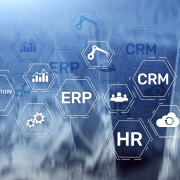Accounting Software Integration
Sophisticated accounting software can have a hugely beneficial impact on any business, but it needs to be able to play nice with enterprise management systems already in place before it can make a difference.
In our experience, if you’re looking to increase productivity, minimize overheads, and, ultimately, stimulate snappy corporate growth, you must be able to integrate your accounting software. So, let’s explore what accounting software integration is, why you might need it, and what your software options are.

What Is Accounting Software?
As you’re probably aware, accounting software is any program that helps bookkeepers and accountants alike with financial transactions and other day-to-day recording or reporting.
Not all accounting software is created equal – it differs depending on the business’s goals and needs.
Some businesses may be looking to implement a more customized solution that can integrate all data from all moving parts of the business. That’s where we come in.
A non-integrated accounting platform will not work in conjunction with any established management systems you have in place to run your business.
All relevant data will have to be taken from these systems and input into the accounting software manually, a time-consuming and costly process.
An integrated accounting software, on the other hand, slides right into the network of management applications you’re already using.
Why Is Integrated Accounting Software Important?
The primary benefit of using integrated accounting software is that it merges with your existing management programs, sourcing all data automatically, utilizing it to give you a more holistic, real-time view of your business finances.
The mind-numbing task of bridging the data from your existing billing, invoicing, and payroll systems is taken care of — you don’t have to lift a finger!
But an integrated software doesn’t just save you time and effort. By completely eliminating manual data logging, human error is removed from the equation, preventing workflow issues further down the line.
Integrated accounting software also tends to be multi-functional, so you don’t have to use quite as many discrete programs, creating a more efficient workflow for you and your team.
How Does Integrated Accounting Software Work?
Have you ever used a battery charging appliance with an IC chip?
These intelligent little bits of hardware give the charger the ability to communicate with and identify connected devices. The charger then knows exactly what sort of current is required to optimize charge times and reduce the risk of battery deterioration.
Well, the technology is a little different, but the same principles apply to any accounting software integration. In an almost AI fashion, it communicates with all your established software, and thus, doesn’t need a translator (you) to aid in data transmission. However, there is a limit to these technological polyglots’ abilities.
As intelligent as software is, it’s not always compatible with systems already in play, which is why checking that a prospective program “speaks the same language” as the apps in your current system is crucial.

Integrated Accounting Software Solutions
There are a handful of accounting software out there that will help your small or medium-sized business with growth, scalability, and overall productivity.
QuickBooks
QuickBooks is a prominent name in Integrated accounting software for small businesses, mostly due to its wide compatibility and a rich feature-set. It integrates particularly well with eCommerce platforms; however, with the name comes a heftier price tag. With brand reputability, you end up paying a bit more for services and add-ons that would otherwise be included in the standard package. Fortunately, there are plenty of Quickbooks alternatives.
Zoho Books
Cloud-based accounting software Zoho Books takes care of payment management, accounts payable, invoice processing, time tracking, ledger reporting, inventory management, and bank reconciliation.
It offers CRM, eCommerce, and payment processing integration, but its most celebrated feature is banking assimilation, which allows users to make payments without going through their bank’s payment portal — it can all be executed through the Zoho Books software.
FreshBooks
FreshBooks offers three key integrations: payment processing, credit cards, and payroll systems. It’s capable of automating expense management, time tracking, and billing, but the real pull of this software is its invoicing protocol.
It provides a number of invoice templates that you can fine-tune to suit your needs and even gives you the option to leave little customized thank you notes.
Xero
Xero offers fixed asset and inventory management, purchase order creation, payment processing, and it integrates seamlessly with payroll applications, payment processing tools, and POS systems, but it’s the sophisticated expense management protocols that really make Xero special.
With Xero, you can track mileage claims, record receipts, monitor spending in real-time, and reconcile expense reports, saving you a lot of manual cross-referencing between financial statements and bank transfers.

SAP Business One: Software for Accounting & Financials
Integrated accounting software tends to be either too expensive and advanced, designed for larger companies, or free/cheap but too rudimentary and sloppy. SAP Business One, however, exists in the “Goldilocks” zone between those extremes – it’s both affordable and designed from the ground up to suit small-to-medium-sized businesses.
This means that you’re not wasting resources on advanced features that don’t apply to your business, and you don’t have to worry about software shortcomings letting money slip through the cracks and limiting the growth rate of your business.
With SAP Business One, no aspect of accounting is outsourced. Absolutely everything is handled within the SAP B1 ecosystem.
Now, let’s take a look at what “absolutely everything” actually means:
- Superior financial reporting
Business One documents all financial activities in a clear chronological order, so every single penny spent or earned has a digital paper trail.
- Financial dashboards and KPIs
Dashboards and key performance indicators are essential to refining your business. The metrics provided by this aspect of the software are your key to an impressive corporate trajectory.
- Fixed assets
Business One takes into account your long-term tangible assets in its algorithms and financial projections, giving you a hyper-accurate picture of enterprise performance.
- Cost accounting
The software delivers precise, step-by-step cost accounting, allowing you and your employees to make informed business decisions on how to streamline your operations.
- Consolidations
If you have consolidated assets or perhaps intercompany initiatives, SAP Business One will account for them, making it easier to compose and implement far-reaching corporate strategies.
- Advanced pricing
State-of-the-art advanced pricing management gives you the insight you need to make product-related decisions and evaluate business performance.
SAP Business One is also a comprehensive ERP software network, taking care of every computer-based aspect of your business, including:
- Financial accounting
- Inventory management
- Material requirements planning (MRP)
- Customer relations management (CRM)
If you’d like some more specifics on what SAP Business One has to offer, you can check out this video of the 10.0 upgrade, the latest iteration of the software.
Alternatively, if you’d like more of an insight into how SAP B1 works and how the interface looks, allow us to direct you to the SAP Business One A/R Invoice Tutorial.
SAP Business One Software Integration
Despite providing everything you need to digitally manage your business, SAP Business One brings impeccable compatibility to the table, merging seamlessly with the following common applications:
- All popular eCommerce apps
- Online retail platforms (Amazon, eBay, Etsy… you name it)
- Customer relations management apps
- 3PLs
- Shipping and logistics apps
- Travel and expense management apps
- Metrc
- Scanning
- POS (Point of Sale)
- WMS (Warehouse Management Systems)
- Field service
- Advanced manufacturing
Bear in mind that this isn’t an exhaustive list. If you’re currently using management apps that aren’t found beneath the aforementioned umbrella integrations, as long as they use industry-standard APIs, SAP Business One will be a perfect fit.
SAP Business One and Support One
Due to the comprehensive nature of SAP Business One, it can offer you something you simply won’t find elsewhere… synergy! With all digital management taken care of within a single system, there are no limitations on efficiency or usability, ensuring nothing stands in the way of business growth.
What’s more, unlike most of the other integrated software on the market, SAP Business One doesn’t just fit your budget – thanks to the advanced flexibility and wide variety of dynamic add-on apps, it can be tailored to your business structure.
SAP Business One ERP may be built from the ground up to support smaller businesses, but with this all-encompassing management software helping you make shrewd decisions at every turn… you won’t be a small business for much longer.
Contact Support One today, and get the ball rolling on your business’s future and growth.










